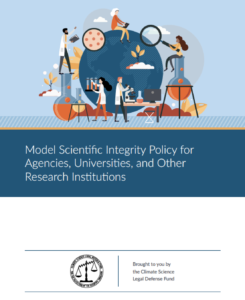Model Scientific Integrity Policy for Agencies, Universities, and Other Research Institutions
 ALERT: The Trump Administration has rescinded the National Institutes of Health (NIH)’s Scientific Integrity Policy.
ALERT: The Trump Administration has rescinded the National Institutes of Health (NIH)’s Scientific Integrity Policy.
We developed this free model language to promote better protections for scientific research and address common weaknesses in scientific integrity policies.
Public trust in science is essential. We rely on government agencies and research institutions to use the best available scientific research when making decisions about harmful pollutants, dangerous pathogens, and other critical issues.
Yet, the politicization of research on climate, COVID-19, and other crises in recent years has hampered our ability to effectively protect human health and the environment.
To address challenges to science, every science-based institution must have a robust scientific integrity policy backed by a culture that ensures the policy is enforced.
Many federal agencies and research institutions have scientific integrity policies. But these policies are often difficult to navigate and, in many cases, lack critical safeguards for scientists and their research, such as prohibiting political interference and protecting against retaliation for reporting issues. Policies frequently also lack a straightforward process for handling scientific integrity complaints, which may discourage scientists from reporting violations.
Research institutions must strengthen their scientific integrity policies, and our free model language assists with this process with improvements in key areas. The policy:
- Prohibits political interference through censorship, pressuring a scientist to alter their work or funding decisions.
- Makes attempting to manipulate or censor a scientist a violation of scientific integrity, even if the attempt is unsuccessful.
- Provides protections for scientists’ right to communicate with the public, the media, and lawmakers.
- Creates clear procedures for handling a scientific integrity complaint, including remedial and disciplinary actions to take when required.
- Provides protections from retaliation for those who report or participate in investigations of a potential scientific integrity violation.
Institutions without a scientific integrity policy can use the language to create one, and those with policies can use it to improve theirs. Questions about this model policy and how to use it? Write to us at lawyer@csldf.org.